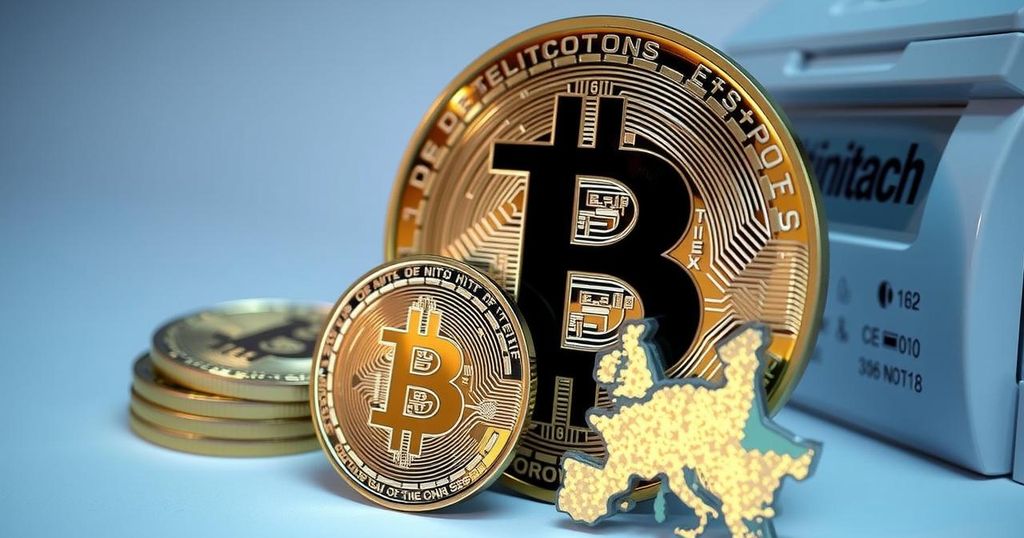Deutsche Bank Highlights Crypto’s Impact on BRICS Payment Systems
Deutsche Bank reveals that BRICS nations now account for 28% of cross-border crypto transactions, driven by geopolitical tensions and sanctions. The bank emphasizes the growing role of cryptocurrencies as alternatives for payment, especially in light of increasing Russian interest in digital assets. This shift signifies a potential move away from reliance on the U.S. dollar in international trade.
In a revealing analysis, Deutsche Bank has charted the rising influence of cryptocurrency within the BRICS nations. With geopolitical tensions swirling, these countries—Brazil, Russia, India, China, South Africa, Egypt, Ethiopia, Iran, Saudi Arabia, and the UAE—are increasingly leveraging cryptocurrencies to navigate the complexities of international trade. The bank highlights that amazed by economic transformations, BRICS nations now represent 28% of all global cross-border crypto transactions, marking a significant shift in the financial landscape.
The surge in crypto usage amidst sanctions reflects the urgent need for alternative methods of payment. As restrictions tighten, traders find solace in the digital realm, with rising transaction volumes growing by an astounding 147% year-on-year. Deutsche Bank has painted a vivid picture of a world teetering on the brink of a crypto revolution, fuelled by the desire to break free from the restraints of traditional fiat currencies, especially the U.S. dollar.
In this evolving narrative, Russia’s burgeoning interest in cryptocurrencies stands out, with the number of users skyrocketing from 3 million in 2020 to over 24 million anticipated by 2024. The growing population of crypto users is a testament to how nations adapt to ensure their economic resilience in the face of adversity, underscoring a market ripe for innovative solutions.
“Digital assets are being considered to be part of the upcoming BRICS payment systems,” revealed Russian Finance Minister Anton Siluanov, illuminating the bloc’s future strategies in their pursuit of economic empowerment. This compelling journey into the world of crypto showcases a testament to resilience and adaptability in the financial domain, heralding a new era of cross-border transactions.
Through these insights, Deutsche Bank not only acknowledges the transformative power of cryptocurrencies but also emphasizes their role in enabling smooth trade relations amid sanctions and international pressures. The financial landscape is witnessing a metamorphosis, one where digital assets provide the lifeline for nations longing to advance without barriers.
Ultimately, this exploration sheds light on how BRICS is stepping into a future where cryptocurrency could redefine their economic interactions and independence on the global stage. As methods of payment evolve, the desire for autonomy and innovation will undoubtedly be at the helm of this vibrant economic expedition.
Deutsche Bank’s recent contemplations underscore the role of cryptocurrencies within the dynamic context of the BRICS nations. The bloc, comprising emerging economies, presents a fertile ground for financial innovation, particularly in response to restrictive financial practices imposed by geopolitical tensions. The ongoing conflicts and sanctions necessitate alternative solutions for trade. With a significant percentage of cross-border transactions now being conducted in crypto, the implications for the future of international finance and trade agreements are profound, marking a shift from traditional reliance on fiat currencies.
In conclusion, Deutsche Bank has illuminated the increasing necessity and role of cryptocurrencies in reshaping payment frameworks within the BRICS bloc. By adapting to geopolitical constraints, these countries are not only utilizing crypto to facilitate trade but also to foster economic independence. As the world watches this transition unfold, the possibilities for a decentralized financial future become more apparent, heralding a transformative journey through the evolving landscape of international finance.
Original Source: news.bitcoin.com




Post Comment